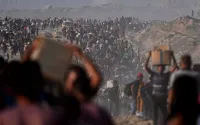Julian Borger in WashingtonEwen MacAskill Patrick Wintour
An intensive six-month search of Iraq for weapons of mass destruction has failed to discover a single trace of an illegal arsenal, according to accounts of a report circulating in Washington and London.
The interim report, compiled by the CIA-led Iraq Survey Group (ISG) of 1,400 weapons experts and support staff, will instead focus on Saddam Hussein's capacity and intentions to build banned weapons.
A draft of the report has been sent to the White House, the Pentagon and Downing Street, a US intelligence source said. It has caused such disappointment that there is now a debate over whether it should be released to Congress over the next fortnight, as had been widely expected.
"It will mainly be an accounting of programmes and dual-use technologies," said one US intelligence source. "It demonstrates that the main judgments of the national intelligence estimate (NIE) in October 2002, that Saddam had hundreds of tonnes of chemical and biological agents ready, are false."
A BBC report yesterday said that the survey group, which includes British and Australian investigators, had come across no banned weapons, or delivery systems, or laboratories involved in developing such weapons.
According to the BBC, the report will include computer programmes, files, paperwork and pictures suggesting Saddam's regime was developing a WMD programme.
Both Washington and London are likely to focus on documentary evidence that the Saddam regime was capable of producing weapons of mass destruction, and probably intended to once international scrutiny had faded.
But the report will fall far short of proving Iraq was an "imminent threat" even to its neighbours.
According to accounts of the ISG draft, captured Iraqi scientists gave the investigation, led by a former UN inspector, David Kay, an account of how weapons were destroyed, but those accounts refer to the period immediately after the 1991 Gulf war.
The NIE was put together last year by the CIA and other US intelligence agencies, and claimed that the Iraqi leader had chemical and biological stockpiles, and a continuing nuclear programme that could produce a homemade bomb before the end of the decade.
The NIE became a key document in the propaganda war by President Bush in the runup to the invasion of Iraq in March, although intelligence officials warned that many of the nuances and cautionary notes from original reports had been removed from the final documents.
The timing of this disclosure could hardly be worse for Tony Blair, days before the start of the Labour party conference.
Iraq has dogged the prime minister almost continuously for five months. Downing Street had been hoping for respite after Lord Hutton's inquiry, which closes today. Mr Blair put forward Iraq's weapons of mass destruction as the reason for going to war and has repeatedly insisted that the weapons would be found.
He told a sceptical Conservative MP in the Commons on April 30 that he was convinced that Iraq had such weapons and predicted that, when the report was published, "you and others will be eating some of your words".
Although Downing Street last night officially dismissed the leak as speculation, government sources confirmed it was accurate. A No 10 spokesman said: "People should wait. The reports today are speculation about an unfinished draft of an interim re port that has not even been presented yet. And when it comes it will be an interim report. The ISG's work will go on. He added: "Our clear expectation is that this interim report will not reach firm conclusions about Iraq's possession of WMD."
The government defence will be to stress that failure to find WMD does not mean that they do not exist.
Last night's leak will fuel the anti-war sentiment ahead of Saturday's demonstration in London for withdrawal of US and British troops from Iraq. It will also make it harder for Labour conference organisers to resist grassroots pressure for a debate on Iraq. The in terim report is at present pencilled in for publication next week but Labour, anxious to avoid it landing in the middle of its conference, is trying to get that changed.
In Washington, congressional aides said they still expected to hear from Dr Kay next week. He arrived back from Iraq last Wednesday and since then has been working on the report. The nuclear section of the survey group has also finished its work and left Iraq.
After addressing the Senate in July, Dr Kay claimed "solid evidence" was being gathered and warned journalists to expect "surprises". No such surprises appear to be in the draft.
The CIA took the unusual step of playing down expectations of the report yesterday.
"Dr Kay is still receiving information from the field. It will be just the first progress report, and we expect that it will reach no firm conclusions, nor will it rule anything in or out," the chief agency spokesman, Bill Harlow, said.
An intelligence official added yesterday that the timing of the report's release "had yet to be determined".
In London, a Foreign Office spokesman said: "It is David Kay's report. We do not have it. We will comment on it when it is presented. When it comes, it will be an interim report. ISG's work will continue. The reports are speculation about an unfinished draft of an interim report that has not yet even been presented yet."
David Albright, a former UN weapons inspector, said: "It's clear that the US and British governments wildly exaggerated the case for going to war."
But he added that the fact that the survey group had not found concrete evidence of weapons did not mean that the Baghdad regime did not have programmes to quickly reconstitute programmes and weapons at short notice. "I'm not surprised, given how incompetent this search has been. They've had bad relations with the [Iraqi] scientists from the start because they treated them all as criminals."
Many of the Iraqi scientists and officials who surrendered to US forces have been held in detention for months without contact with their families, despite assurances they would be well treated if they cooperated.
But recently the Bush administration, under mounting pressure to justify the invasion, has been trying to improve the incentives for former Saddam loyalists to provide information.
Reuters quoted a senior US official yesterday as saying that the former defence minister, Sultan Hashim Ahmed, had been given "effective" immunity in the hope he would provide information on Saddam's weapons programmes.
The foreign secretary, Jack Straw, at the United Nations general assembly, declined to comment on the report. "If people want evidence, they don't have to wait for Dr Kay's report. What they can do is look at the volumes of reports from the weapons inspectors going back over a dozen years including the final report from Unmovic on March 7 this year, which set out 29 separate areas of unanswered disarmament questions to Iraq," he said.





